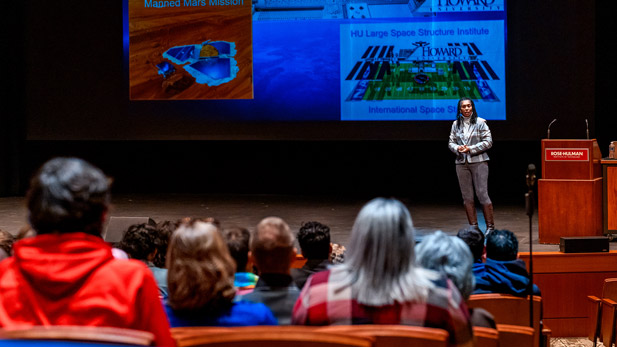In MLK Day Talk, Rocket Scientist Urges Students to Turn Their Dreams into Future Reality

As this year’s Dr. Martin Luther King Jr. Commemorative Convocation speaker, rocket scientist Aprille Ericsson, PhD, encouraged students to take advantage of the boundless opportunities to make a difference in STEM fields.
Diverse ideas continue to spark innovation and imagination that’s propelling the future of space exploration throughout the universe. And Rose-Hulman students can play a role in bringing those ideas to life by using their keen problem-solving skills, ingenuity, and creativity to work together with others to achieve things that are bigger than themselves.
“Turning Today’s Dreams into Tomorrow’s Reality” was the inspirational message brought to Rose-Hulman by award-winning rocket scientist and technologist Aprille Joy Ericsson, PhD, in a special convocation that helped the campus community celebrate this year’s Dr. Martin Luther King Jr. Day.
During more than a 30-year career with NASA, Ericsson has worked as an aerospace engineer, technologist, and project and program manager on projects that have sent spacecraft to bodies throughout the solar system. She supported the development of the laser instrumentation for the Lunar Reconnaissance Orbiter that helped map the landscape of the Earth’s Moon, the Wilkerson Microwave Anisotropy Probe and ICESat-2 Atlas, a laser altimeter instrument that measured the effects of climate change on ice sheets of Greenland and Antarctica and impact on the global sea levels.
As President Biden’s nominee to be the first Assistant Secretary of Defense for Science and Technology, Ericsson hopes to have a role in setting the NASA’s strategies to put humans once again on the Moon, explore Mars, and create more powerful space telescopes to examine other elements of the universe.
“As we try to figure out how to live [on Earth], we’re going to succeed by working together,” she told the audience in the Hatfield Hall Theater. “We are engineers. We can do anything that united we strive to succeed … Be engineers of change. You are the future. Don’t forget the vision of diversity that you have imagined.”
Inspired by the words and actions of African Americans Martin Luther King Jr., Katherine Johnson (groundbreaking NASA mathematician), and Nichelle Nichols (actress who played Lt. Uhura on the original “Star Trek” television show), along with several high school and college educators, Ericsson went on to break ground within science and engineering.
A native of Brooklyn, New York, Ericsson was the first African American female to receive a doctorate in mechanical engineering from Howard University, after earning a bachelor’s degree in engineering from Massachusetts Institute of Technology. She later became the first African American female to receive a doctorate degree in engineering from NASA’s Goddard Space Flight Center.
Ericsson also has received The Washington Award from the Western Society of Engineers; the Ralph Coates Roe Medal, the highest award bestowed by the American Society of Mechanical Engineers; and been named one of the top 50 minority women working in science and engineering fields, by the National Technical Association; and ranked eighth in a 2016 list of the 20 Most Powerful Women Engineers by Business Insider.
“Her journey is nothing short of inspiring,” said Rose-Hulman President Robert A. Coons while introducing Ericsson. Her speech was organized by the Office of Diversity, Inclusion, and Belonging.